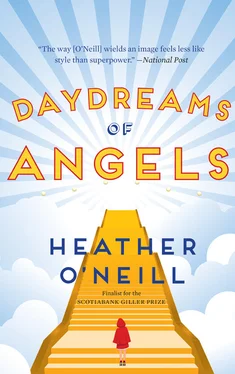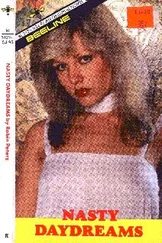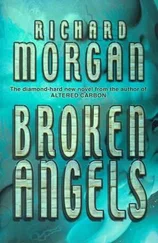And nobody could understand why they weren’t happy. They were famous and surrounded by strangers who were madly in love with them. Wasn’t that what everybody deep down really, really wanted?
On the island the twins would sit and imagine being rescued. They imagined every mundane daily task, except to them it seemed miraculous. They thought about how unbearably lovely it would be to skip to the store and buy a carton of chocolate milk. They thought that happiness was on another shore, calling for them. When they arrived, they were shocked that they weren’t delighted. Having grown accustomed to imaginary couches and birthday cakes, they couldn’t be satisfied by things that were real. On the island they had felt their hearts fill up with hope, like sails filling with wind. All that desire had made their hearts enormous. Their longing for happiness was happiness itself.
One night the twins crawled out a window. They hurried down the winding back alleys and went down to the river. The puppies followed them all the way to the riverbank. They bought a tiny ship. They left all the maps on the shore so that they would be sure to get lost.
As the ship pulled away, all the dogs began to moan and howl and bark. They sounded like a choir of baritones. The noise was so loud that it woke people up throughout the city. People got out of their beds wearing their striped pyjamas and their hair in curlers. Realizing what was happening, they hurried down to the river in their bare feet and slippers.
By the time the crowd had gathered, it was too late, the twins had already set sail. They cried for the twins to come back. The twins merely waved a little. Their faces, so pale and unhappy, were like two small moons. The people stood silently on the banks, watching the twins getting swallowed up by the distance.
And then one day about six months later, a group of bottles, travelling together like a school of salmon, washed up on the shore of Brighton beach. The twins were back on a desert island, trapped, and were writing again. There was rejoicing.
And over the course of the next decades, there were to be many wondrous epistles from the twins, who had settled into their strange identities as artists and had found their places apart and yet part of the world.
1.
Ferdinand was a little boy with black hair who lived on St. Philippe Street in Little Burgundy, a neighbourhood in Montreal. His family lived in a tiny white bungalow that had been in the family for two generations. It had a cast iron fence out front that had been painted light blue. There was a pot of flowers on each step on the front stoop, one of which had a little Quebec flag stuck inside it. There was a little errant rose bush growing next to a gas pipe in the ground, and its lone flower blew in the wind like a child with a sweater stuck over its head. Theirs was the only bungalow on the block. There was a brick building to the left of it, painted bright red, and one to the right that was painted blue. His family was proud because they owned their own property and didn’t have to rent like nearly every other family in the neighbourhood.
Ferdinand was the youngest child of this noble family. He grew his hair long over his ears and his eyes. He was so skinny that his shoes always looked five sizes too big. When he took his shirt off at the swimming pool, everyone was amazed that anybody could be so skinny. It was strange that he in particular was so skinny, because his four older brothers were such strapping teenagers. When they walked down the street, people got out of their way. They were always in fights and some sort of trouble.
But not Ferdinand. He always wanted to be around his mother. He wanted to ride in the baby part of the grocery cart, even though he was nine years old. He would make himself all weepy at night, telling his mother how he was never going to move out when he grew up.
Ferdinand was a sensitive little boy. He didn’t want to eat his shelled peanuts because he said that they were so cute and that they looked like little babies wrapped up in blankets and he didn’t want to disturb them. He pushed a water balloon around in an umbrella stroller for an entire afternoon. He even told the balloon to settle down or it wouldn’t get to watch TV when they got home.
Ferdinand wanted to be left alone to daydream. He lay in his sleeping bag, all zipped up, for an hour, trying to imagine exactly what it would feel like to be swallowed by a whale. He sat in the big cardboard box that the television came in, with his head protruding from a hole. He wanted to take the opportunity to spend one single afternoon being a turtle.
Ferdinand’s most favourite thing, however, was to lie in the sun. He lay like that in the public park, near the statue of a mad French-Canadian general. There were always people with suitcases looking for empty cans and bottles that they could return to the store. They circled around Ferdinand, who paid them no mind. He liked feeling like the sun was melting him, that he was turning into liquid and spreading all over the ground.
His father worried about what on earth would become of Ferdinand, because he had never seen such a lazy child. Ferdinand fell asleep watching television in the evening while squashed on the couch between his brothers, with a chocolate sundae on his lap. He wanted Velcro shoes because he didn’t like tying his shoelaces.
Ferdinand’s father also noticed that Ferdinand showed no disposition toward being an athlete. Everyone in the family boxed. He himself had been an amateur in his day. His other sons all boxed and won prizes and trophies in all sorts of tournaments. Ferdinand’s father ironed the patches that his boys won onto their sweaters. One of the boys was eventually going to be a champion boxer, he was sure. The father fantasized about the day that he would be photographed for the newspaper with his arm around one of his sons.
Ferdinand’s father adored having a big family of boys and he liked how masculine his older sons were. They always had pretty girlfriends sitting on the porch with them. He could never remember which girl belonged to which boy. He liked how rambunctious they were, even though they got out of control sometimes.
He had no idea what to make of Ferdinand. Once he came home from work and Ferdinand was on the porch, sitting on a chair with his legs spread and playing an imaginary cello. His eyes were closed and he was violently twisting his head around, as if in a fit of rapture.
Another time, when he went to take a leak in the bathroom, Ferdinand was in the bathtub. He had a big pompadour of suds stacked on top of his head. “Please, call me Prince Antoine,” Ferdinand said in a Parisian accent while batting his eyelashes.
Ferdinand’s father felt full of dread. Maybe there was nothing wrong. Maybe he was just imagining things, but he didn’t remember imagining things with any of his older boys. He had had no sneaking suspicion about anything with the others.
He had named Ferdinand after his grandfather who was built like a bull and was never affected by the cold. But he sometimes thought they had brought the wrong kid home from the hospital. His real youngest kid was out there winning every boxing match he entered, while Ferdinand liked to take the boxing trophies down from the shelves and play with them like they were Barbie dolls. Still, the father enrolled Ferdinand in a boxing program. He decided to let him do whatever the hell he liked as long as he agreed to join the gym when he was thirteen years old. It was a family tradition.
Ferdinand would never in a million years have signed up for it on his own. He didn’t complain though. He was aware that he was not acting the way that his father wanted, and since he wasn’t willing to give his poetic way of life up, the least he could do was to go to box once a week. It couldn’t be that bad.
Читать дальше












